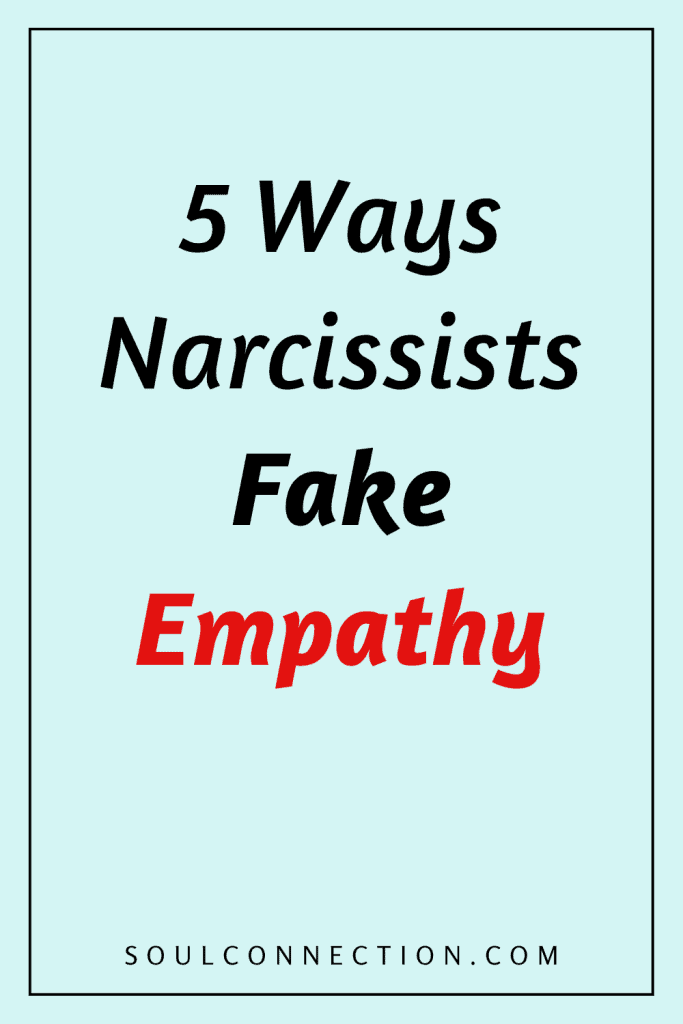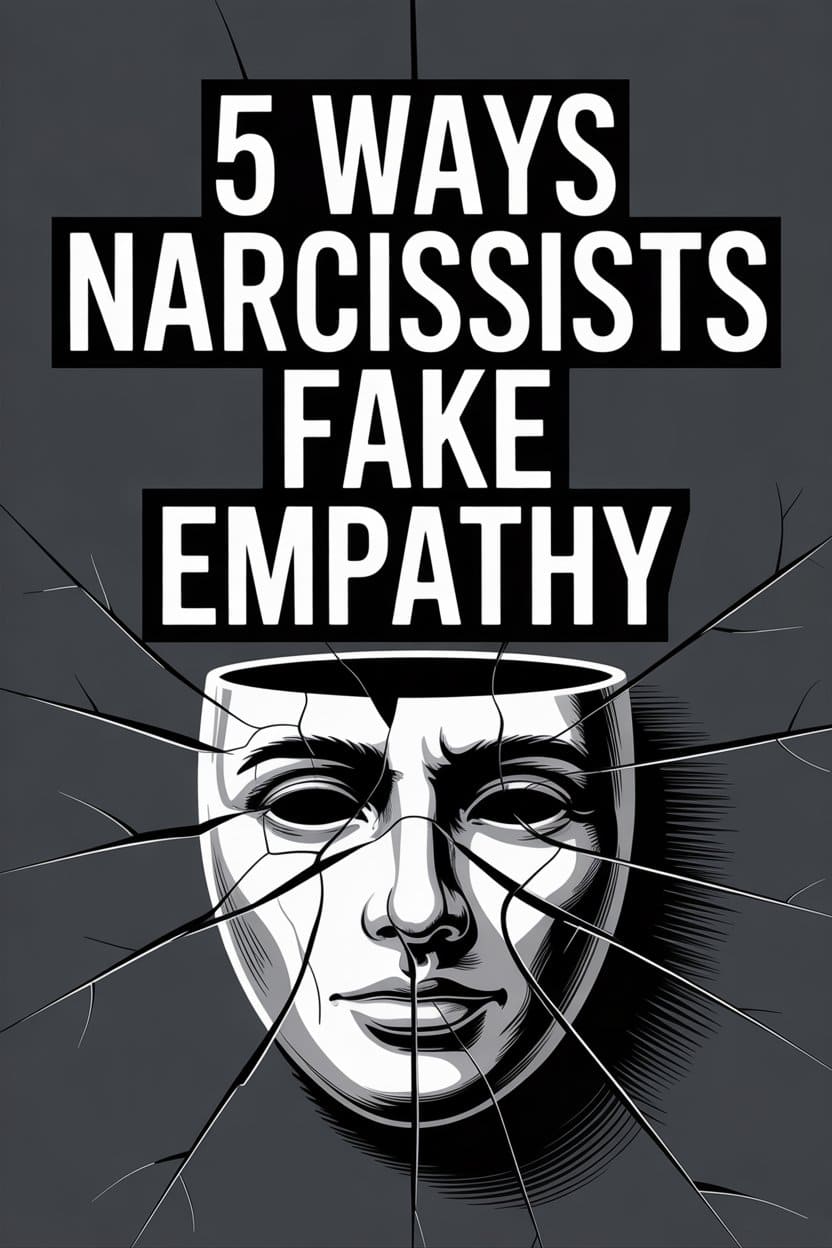Ever watched someone pretend to care and thought, “Wow, that’s an Oscar-worthy performance”? If you’re dealing with a narcissist, this show is probably on repeat.
Narcissists aren’t exactly known for their genuine emotional depth. But they do know people expect them to act “human” from time to time. So, out comes the faux empathy routine—think less Mr. Rogers, more drama club.
Spotting these empathy knock-offs is crucial if you’re tired of feeling like you’re starring in a telenovela you never auditioned for.
Grab a cuppa, because it’s time to unmask the five most common ways narcissists fake empathy—and what to do when you see it.
1. Mirroring Your Emotions… Badly
Narcissists fancy themselves emotional chameleons. They watch your face, listen for cues, and then reflect back what they think you’re feeling.
Sometimes, it’s nearly convincing. Until they overshoot—like laughing when you’re quietly upset, or offering a teary “I totally get it,” right after you stub your toe.
Instead of genuine connection, you’ll notice something’s a bit off. Their responses might feel exaggerated, robotic, or just mismatched. Like they’ve Googled “How to act sad” and are now beta-testing it on you.
Next time someone mirrors your emotions a little too perfectly—without actually listening—press pause. Ask a clarifying question or simply express your feelings more directly.
If their empathy is real, it’ll deepen the conversation. If not, prepare for more cringe-worthy improv.
2. Turning the Spotlight Back on Themselves
Empathy, real empathy, is about being there for someone else. Narcissists missed that memo. When they “empathize,” they’ll often hijack the story and reroute the emotional expressway straight to their own station.
Confide in them about a tough day, and suddenly you’re hearing about the time they survived a much harder ordeal.
Share your disappointment, and somehow it morphs into a monologue about their childhood trauma, their big break, their bad back… You get the idea.
Does it seem like every conversation is a competition for who’s suffered more? That’s a hallmark of fake empathy.
To set boundaries, try steering the conversation back: “I’d appreciate if we could focus on what I’m going through right now.” It’s not selfish—it’s self-preservation.
3. Dishing Out Cookie-Cutter Comfort
Who doesn’t love a good platitude? “It could be worse.” “Everything happens for a reason.” “You’ll get over it.”
Narcissists are masters of the empathy Hallmark card. The words are there, but the heart left the building ages ago.
Instead of specific, thoughtful support, you get blanket statements that sound suspiciously like they’re reading from a script. They don’t ask follow-ups, don’t dig deeper, and certainly don’t risk any emotional labor beyond the bare minimum.
This one’s easy to spot: If every comfort phrase could be stitched onto a pillow, you’re in the presence of faux empathy. Next time, ask for what you actually need—“Can you listen for a bit without giving advice?”—and see how they respond.
Genuine empathy means meeting you where you are, not tossing out catchphrases.
4. Using Empathy as a Manipulation Tool
Narcissists don’t just fake empathy for show—they weaponize it. When they need something from you, suddenly they’re the world’s most “understanding” partner, friend, or colleague.
They’ll listen, nod, and offer exactly the words you’ve been craving… until you’ve given them what they want.
Curiously, their empathy dries up right after their needs are met. If this cycle feels familiar, you’re not imagining things. It’s empathy on tap—and you’re the keg.
Spot the pattern by tracking when their “support” shows up. Is it always right before a favor? After you’ve threatened to walk away? Authentic empathy has no strings attached.
If you feel like you’re being hustled, you probably are. Draw a line in the sand and keep your boundaries clear—no amount of sympathy should cost you your self-respect.
5. Playing the Wounded Hero
Narcissists love a good pity party—especially when it means they can appear “deeply affected” by your pain. Cue the heavy sighs, dramatic pauses, and, if you’re lucky, a single glistening tear (rare, but impressive when you see it).
But the story always circles back to their own emotional turmoil. “I’m just so upset about what you’re going through, I don’t know if I can handle it.”
Translation: “Focus on me now, please.”
Real empathy doesn’t redirect the spotlight. It shares in someone else’s experience without eclipsing it.
When emotional support turns into a performance, and you find yourself comforting them after sharing your own struggles, take note. That’s not empathy—it’s attention-seeking wrapped in a sympathy sweater.
What can you do? Politely remind them that you’re the one who needed support. If necessary, limit how much you share with people who make your pain about themselves. It’s not cold—it’s smart.
Tuning Your Empathy Radar
Genuine empathy feels warm, safe, and sometimes a bit vulnerable—for both people. Even if you’re not dealing with a full-blown narcissist, most of us could use a refresher course in what real listening looks like.
When you notice someone’s “empathy” feels staged, mismatched, or conditional, trust your gut.
Set boundaries, speak up about your needs, and don’t settle for emotional crumbs. You deserve the main course.
And if you’re still not sure who you’re dealing with, remember: Narcissists may be good actors, but their empathy usually has an off switch. You don’t need to stick around for the encore.
Real empathy isn’t a show. It’s a conversation. Demand nothing less.


